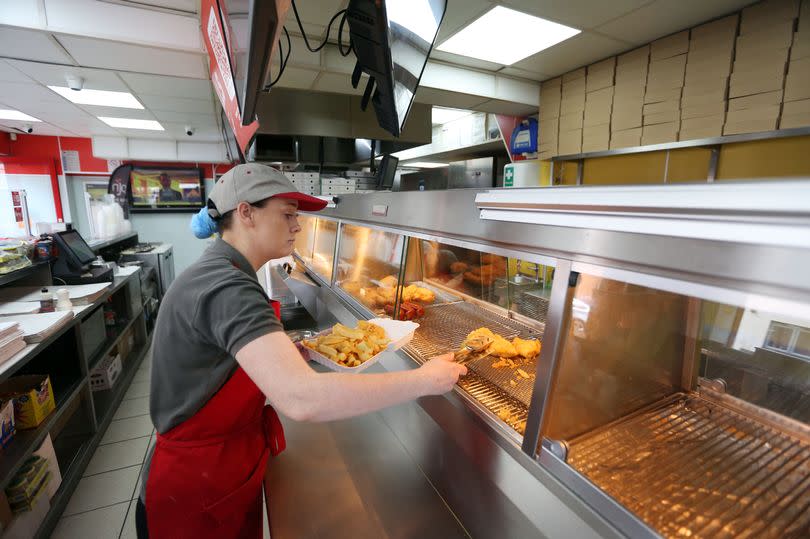Doctor reveals most unhealthy item you can buy at the fish and chip shop

Fish and chips is the British national dish and a visit to the chippy is a treat that millions of us look forward to. Now a doctor has revealed that, while fish and chips can be part of a balanced diet, there's one item at the chip shop that's best avoided if you're watching your weight or looking after your heart.
Doctor Deborah Lee has identified the popular chip shop item that's mush more unhealthy than any of the others. And no, before you ask, it's not a deep-fried Mars bar or fish and chips.
She has warned people against eating battered sausages. Dr Lee has gone so far as to describe them as 'a health bomb' and went on to explain in detail just what makes them so very bad for our health.
READ MORE Experts say removing one item from your bed can help you sleep better
READ MORE Researchers say 3p tablet can make you 'happier', reduce anxiety and tackle tiredness
Talking to The Express, Dr Lee, from the Dr Fox Online Pharmacy, warned people against ordering the chippy favourite, explaining: "The unhealthiest thing you can eat in a fish and chip shop is not the fish and chips. After all, a 100 gram portion of cod contains 18g of protein and less than 0.1 per cent of saturated fat.
"Compare this to a sausage which contains 15g of protein but a whopping 27.8g of saturated fat. Now coat it in batter and deep fry it and what have you got it's a battered sausage health bomb. Many people opt for two battered sausages. Two battered sausages and chips total 1,249 calories."
Aside from the calorie count, she warned that battered sausages are unhealthy because of:
Saturated fat and salt
Eating too much saturated fat in the diet raises cholesterol levels and increases the risk of atherosclerosis, she warned.
Dr Lee said: "Atherosclerosis is the main cause of heart disease, heart attacks, heart failure, stroke and peripheral vascular disease. Having too much salt in the diet is a major cause of high blood pressure, which further increases the risk of heart disease and stroke."
Red meat
Dr Lee said: "Eating too much red meat increases the risk of bowel cancer. A 2015 meta-analysis concluded that eating red meat once a week increased the risk of bowel cancer by 40 percent, and each extra 50g of processed meat after this further increased the risk by 20 percent."
Processed food
Sausages are a type of processed food and contain preservatives such as nitrates, nitrites and phosphates along with modified starch.
"Nitrates when subjected to high heat such as frying in oil turn into nitrosamines which are potent carcinogens that increase the risk of lung, brain, oesophageal and stomach cancer," said Dr Lee.
Oil and trans fats
Fried foods contain high levels of dangerous trans fats, warned Dr Lee, saying: "Trans fats also clog arteries and are a major contributor to heart disease and stroke.
"They increase levels of systemic inflammation and insulin resistance and increase the risk of type-2 diabetes. The NHS recommends we should have no more than 5g of trans fats per day."
"The batter is high calorie and nutritionally depleted. It's almost exclusively carbs with a very high salt content and almost zero nutritional content.
"Eating food coated in batter simply adds calories with no additional nutritive value. Furthermore, the batter is fried with all the provisos above."
NHS advice on healthy eating
The NHS website has eight practical tips for eating healthily. Although their tips are not chip-shop specific, they are useful:
Starchy carbohydrates such as potatoes, rice, bread, pasta and cereals, should make up about a third of your diet. Try to go for wholemeal varieties as they contain more fibre.
Fruit and vegetables are very important and the NHS says that you should eat at least five portions a day. Your fresh fruit and vegetables can be fresh, frozen, canned or dried.
Eat fish, including oily fish such as salmon, sardines or mackerel because they are also a good source of vitamins and minerals as well as protein.
Limit saturated fat and sugar in your diet. Saturated fat increases the amount of cholesterol in the blood which can lead to heart disease. Too much sugar increases the risk of obesity and tooth decay, especially fizzy and alcoholic drinks.
Eat no more than 6g of salt a day as this can raise your blood pressure. People with high blood pressure are more likely to suffer from heart disease or have a stroke.
Take some exercise and maintain a healthy weight because being overweight leads to health conditions such as type-2 diabetes, certain forms of cancer, heart disease and stroke. You can check whether you are a healthy weight by using the BMI healthy weight calculator here.
Stay hydrated with between six and eight non-alcoholic drinks a day. Water, semi-skimmed milk, tea and coffee are better than fizzy drinks with lots of sugar.
Remember to have breakfast. It's often described as the most important meal of the day. Many cereals contain lots of sugar so be careful to choose one that's high in fibre and low in fat and sugar. Maybe slice a banana over the top for one or your five a day.

 Yahoo News
Yahoo News 
